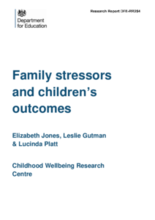This new study from the Childhood Wellbeing Research Centre, an independent research center with funding from the United Kingdom Department for Education, identifies which family stress factors and parental behaviors are associated with positive and negative outcomes for children at the age of 7 and whether stressful life events experienced in childhood are associated with negative outcomes in adolescence. A literature review was carried out to highlight existing associations between family background factors, parental behaviors, and children’s outcomes, followed by analysis of two longitudinal data sources: the Millennium Cohort Study (MCS) and the Avon Longitudinal Study of Parents and Children (ALSPAC) from England. The five outcome measures considered were non-verbal cognitive skills, verbal cognitive skills, math skills, Key Stage (KS1) attainment, and behavior.
The analysis confirmed that child poverty is closely associated with negative performance on all five outcomes where children exhibited poor non-verbal, verbal, and math skills, lower KS1 attainment, and more behavioral difficulties. A child’s longstanding illness or disability also contributed to negative outcomes in all five areas for the children at the age of 7. Some other risk factors that impacted three or more areas of the outcome include the higher number of siblings, father’s illiteracy, and higher frequency of discipline. Factors associated with at least three areas of positive outcomes include higher level of mother’s education, more rooms in the home and frequency of the mother reading to child. The mother’s higher level of education was consistently associated with positive outcomes in all five areas. When poor children were compared to non-poor children, poor children with more grandparental care performed better than expected at KS1 than their counterparts, indicating the importance kinship care and its positive impact despite the poor economic condition of the family.
In regards to teenage outcomes, the study found that stressful events associated with lower KS3 attainment and negative wellbeing include domestic abuse, victimization or abuse outside of family, homelessness or being placed in alternative care settings like foster care. Young people who experienced homelessness or had been placed in foster care early in life (before 7) had continuing and worsening emotional wellbeing from ages 10 to 13 and those who became homeless or placed in care after age 10 had lower emotional wellbeing than their peers. Parental divorce, parental arguments, separation from parents and siblings, moving or attending a new school were identified as stressful life events associated with lower educational attainment and negative wellbeing, but only when the events occurred after the child turned 7 years of age. As the analysis highlights, there is a diversity of stressful events in childhood and their negative consequences impacts a range of outcomes. It also shows that some events are significant only if they occur later in childhood.
The authors concludes that the research shows that a wide range of family and parental characteristics both positively and negatively impacts a child’s outcome although poverty and parenting are proven to have stronger implications than other factors.
©Childhood Wellbeing Research Centre, UK Department for Education

